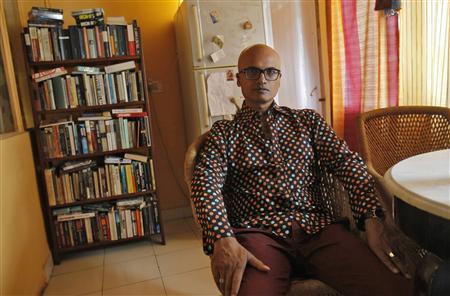(Reuters) – Jeet Thayil, one of the nominees for the 2012 Man Booker Prize for the year’s best novel in English, paints a stark portrait of Mumbai, or Bombay as he calls it, in his debut novel “Narcopolis”.

Thayil is a poet and musician who has been writing poetry since he was 13. His novel takes the reader through the Mumbai drug world’s smoky alleys and features the musings of opium addicts in the late 1980s – a situation that Thayil, a former opium addict himself, knows well.
Thayil spoke with Reuters about his deep relationship with Bombay, his addiction and how this book came about.
The Man Booker prize will be announced Oct 16.
Q: What is your connection with Bombay?
A: “I went to school there as a boy. I went to St. Xavier’s. My family left for Hong Kong when I was eight where my father was working as a journalist. Then I went to school in New York and then came back to Bombay in 1979 and joined Wilson College. In all, I’ve lived in Bombay for almost 20 years.”
Q: Does this make you feel strongly about the city?
A: “Bombay does that to people. It makes a (connection) with you. It makes it difficult for you. It bludgeons you. I’ve been reading about that area, Shuklaji street. It is disappearing now — Kamatipura, Shuklaji street, (the) entire area between Mumbai Central and Grant Road is disappearing, being bought away by real estate sharks who are buying up all the broken-down houses and making tall buildings. So very soon that entire district will disappear, and with it a million stories. A look of Bombay will go… a certain character will go. Those people who live there now of course won’t be able to afford to live there.
“At the end of ‘Narcopolis’, I have tried to draw that picture a little bit – that Bombay will become a very uniform-looking place. The kind of variety you used to be able to find there … like dockyards, for example. It will bear a high-rise tenement kind of look uniformly.”
Q: How do you look at this change?
A: “No question, for bad. Not saying purely in a nostalgic way, I mean also politically. The political changes that have happened, the kind of changes that have happened in terms of money. The way the rich have become constantly richer while the poor are exactly where they were. So the divide has become even larger than what it was. And the whole right-wing thing that’s happening in Bombay. The way outsiders, people of other communities, are made to feel unwelcome. These are the kind of things that one could have never imagined in Bombay. It was welcoming. Anybody with talent, ambition, with beauty, with brains … you could make it in Bombay. That is the point of this city. One thing after the other has been chipped away.”
Q: In an interview you used the word “seductive” for Bombay. In “Narcopolis”, words seem to come from under a cloud of smoke. Is there a parallel you have drawn between opium and Mumbai?
A: “That’s kind of hinted at in the book where the change from Bombay to Mumbai takes place … It’s the change from this old 19th century romantic, glamorous, quiet, slow world of opium to the quick, brutal, modern, degrading world of cheap heroin. Interestingly, now there has been a class shift – it’s the poorest who do it, absolute down-and-out street guys. When opium was happening, it was respectable. The well off did it, the upper-class Urdu-speaking … it had a whole culture with it.”
Q: Was writing “Narcopolis” difficult?
A: “It took me five years to write it in all … I was working on a lot of (other things) as well. I didn’t realize what the nature of the difficulty would be. And what it turned out to be was the opposite of catharsis. Catharsis gets stuff out of you. But this put bad feelings into me. Thinking about the nature of addiction, which I hadn’t done in all those years. I had to be clean to think about it … what it takes out of you, what it gives you. It gives you a lot. Wonderful things, which I know I’m not supposed to say, but it’s a fact. It gives you a sense of being loved. There is no boredom ever, time becomes your slave, or the slave of your agenda. There is never an existential question. It gives you freedom in a way.”
Q: How do you look back at the addiction phase?
A: “I look back at it with yearning. It’s a bad thing!”
Q: There is a very important character named Dimple in the book – a eunuch who makes pipes in the opium den and identifies as a woman. Was she based on a real person?
A: “She was the one who made pipes in an opium den in about 1980-81. I only saw her twice. Then she disappeared. Many people in that world disappear. There was something about the way she used to make the pipe, very elegant.”
Q: Why the long sentences?
A: “The opening sentence, the prologue, I wrote that about halfway through the writing of the book, and when I wrote that sentence, I realized this is the way the book should be. And I rewrote the book, changing the language of it with long sentences … rather than short sentences because I realized the only way to write about opium was to write long, open-ended sentences where the writer who is writing it has no idea where the sentence is going to go. So you follow it and there is a sense of discovery – for the reader as well, I hope. You couldn’t write a book about opium, which is a very slow, long process, with short quick Hemingway, journalistic, telegraphic sentences. So once I kind of stumbled on that, it changed everything. Then the book happened very fast.”
(Reporting by Anuja Jaiman, editing by Elaine Lies)





